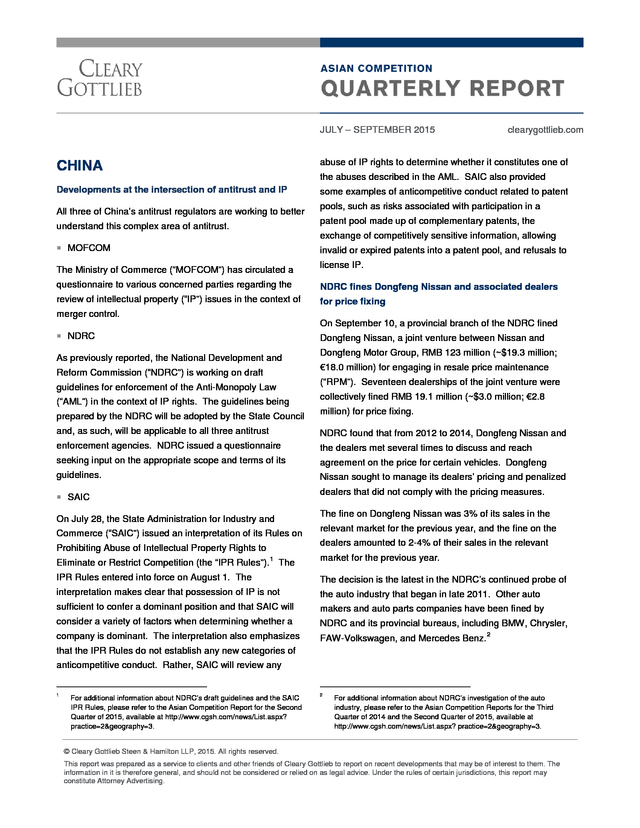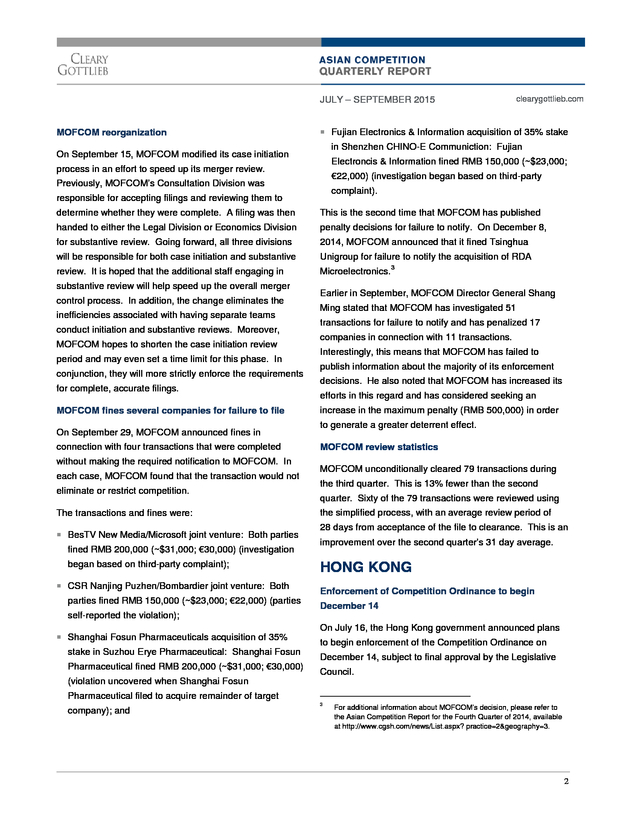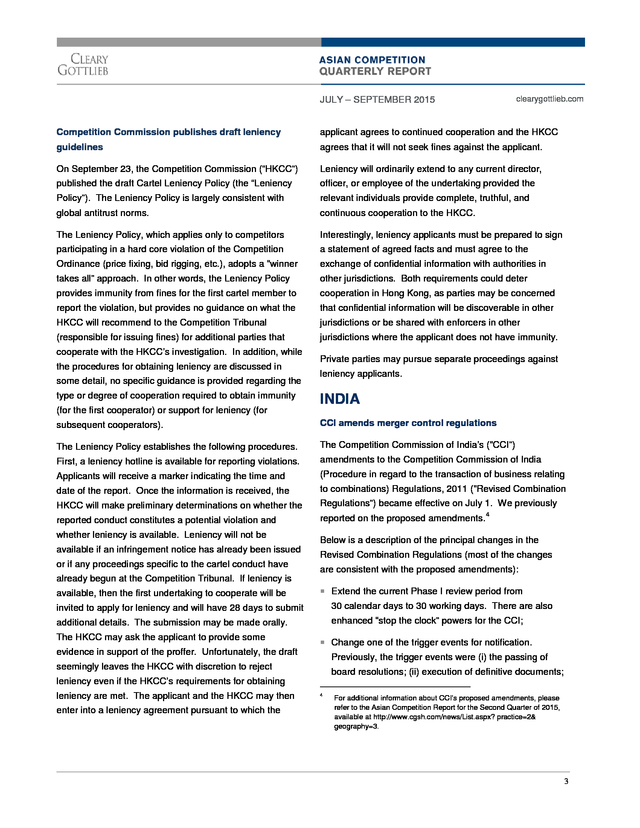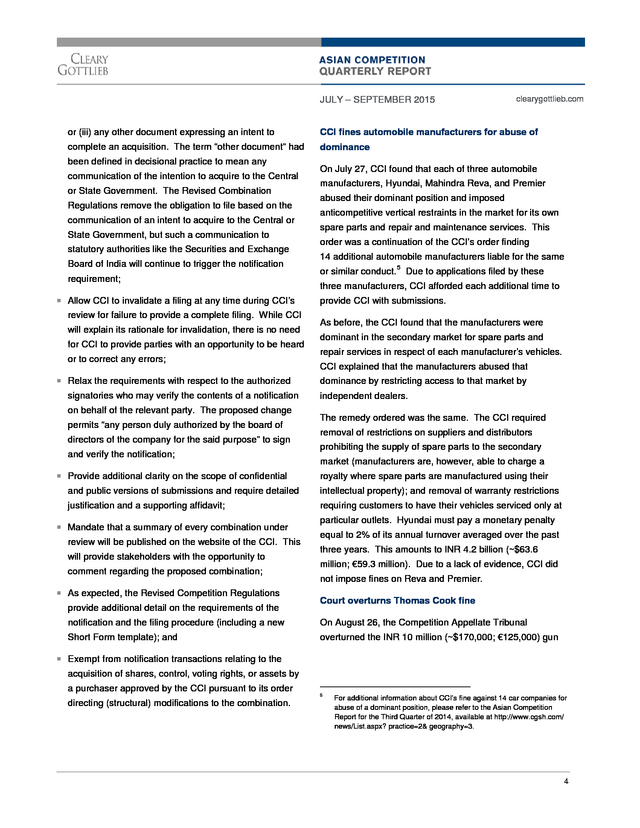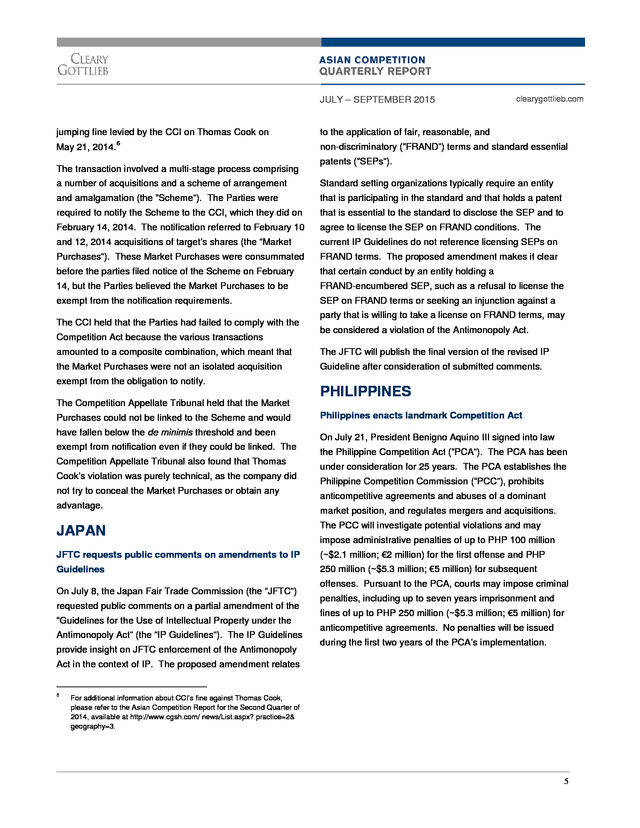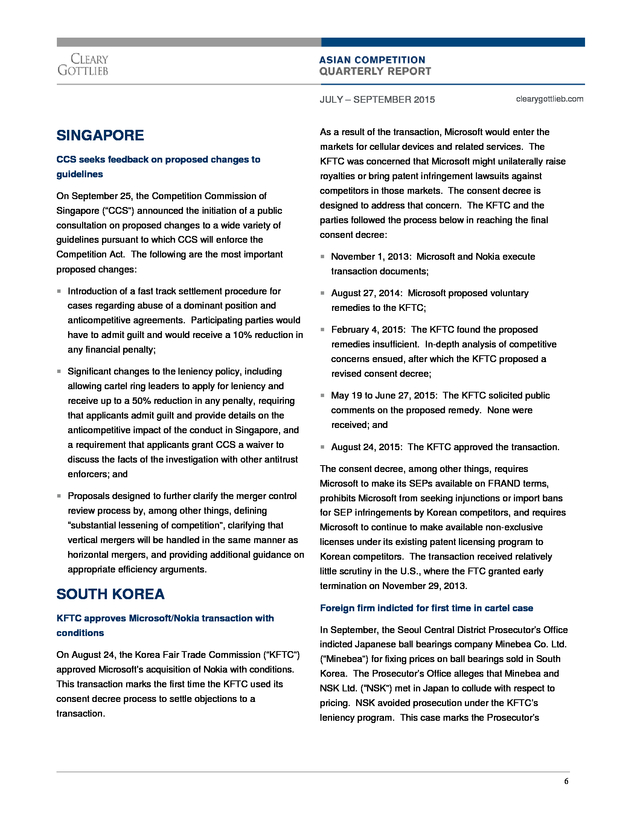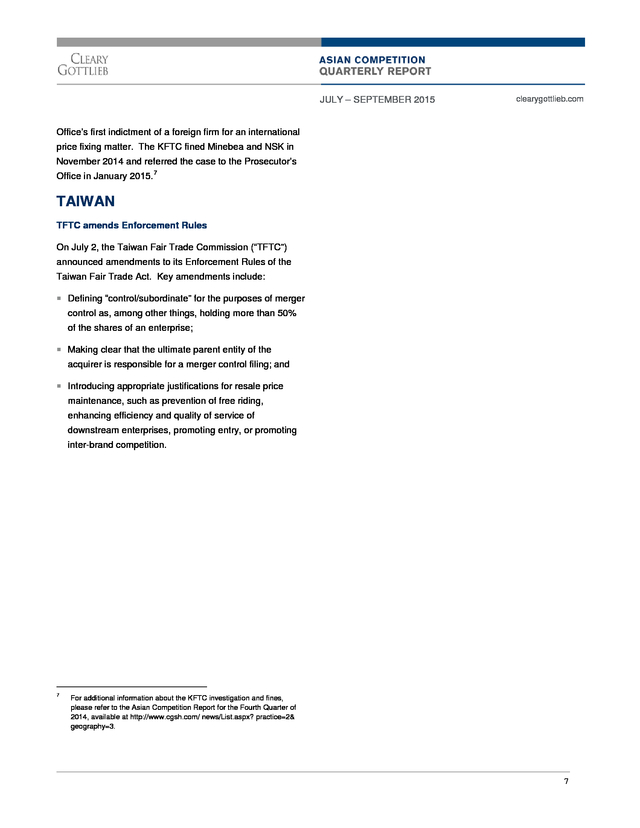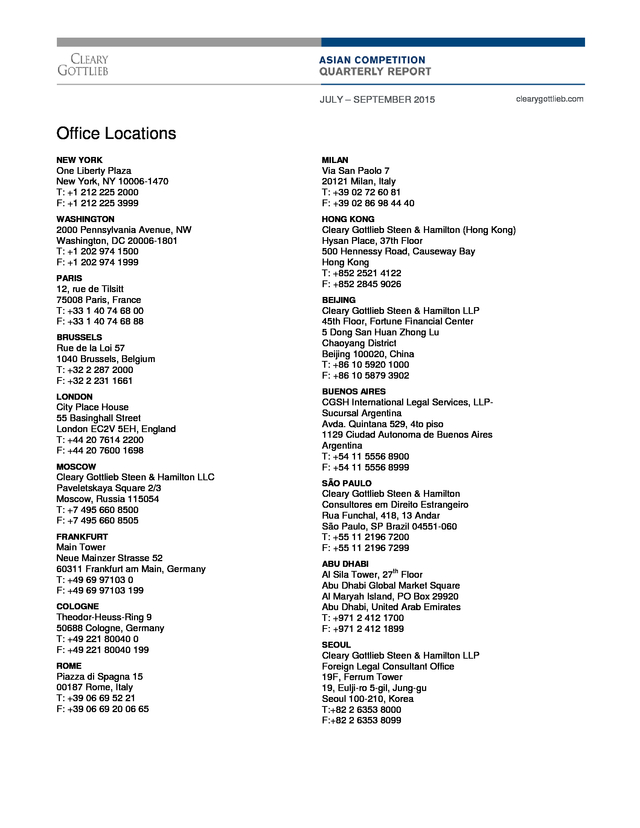Description
JULY – SEPTEMBER 2015
clearygottlieb.com
CHINA
abuse of IP rights to determine whether it constitutes one of
Developments at the intersection of antitrust and IP
some examples of anticompetitive conduct related to patent
the abuses described in the AML. SAIC also provided
All three of China’s antitrust regulators are working to better
pools, such as risks associated with participation in a
patent pool made up of complementary patents, the
understand this complex area of antitrust.
exchange of competitively sensitive information, allowing
ï‚¡ MOFCOM
invalid or expired patents into a patent pool, and refusals to
The Ministry of Commerce (“MOFCOM”) has circulated a
license IP.
questionnaire to various concerned parties regarding the
NDRC fines Dongfeng Nissan and associated dealers
review of intellectual property (“IP”) issues in the context of
for price fixing
merger control.
On September 10, a provincial branch of the NDRC fined
ï‚¡ NDRC
Dongfeng Nissan, a joint venture between Nissan and
As previously reported, the National Development and
Dongfeng Motor Group, RMB 123 million (~$19.3 million;
€18.0 million) for engaging in resale price maintenance
Reform Commission (“NDRC”) is working on draft
guidelines for enforcement of the Anti-Monopoly Law
(“AML”) in the context of IP rights. The guidelines being
prepared by the NDRC will be adopted by the State Council
(“RPM”). Seventeen dealerships of the joint venture were
collectively fined RMB 19.1 million (~$3.0 million; €2.8
million) for price fixing.
and, as such, will be applicable to all three antitrust
NDRC found that from 2012 to 2014, Dongfeng Nissan and
enforcement agencies.
NDRC issued a questionnaire the dealers met several times to discuss and reach seeking input on the appropriate scope and terms of its agreement on the price for certain vehicles. Dongfeng guidelines. Nissan sought to manage its dealers’ pricing and penalized dealers that did not comply with the pricing measures. ï‚¡ SAIC On July 28, the State Administration for Industry and Commerce (“SAIC”) issued an interpretation of its Rules on The fine on Dongfeng Nissan was 3% of its sales in the relevant market for the previous year, and the fine on the dealers amounted to 2-4% of their sales in the relevant Prohibiting Abuse of Intellectual Property Rights to 1 Eliminate or Restrict Competition (the “IPR Rules”). The market for the previous year. IPR Rules entered into force on August 1.
The The decision is the latest in the NDRC’s continued probe of interpretation makes clear that possession of IP is not the auto industry that began in late 2011. Other auto sufficient to confer a dominant position and that SAIC will makers and auto parts companies have been fined by consider a variety of factors when determining whether a NDRC and its provincial bureaus, including BMW, Chrysler, company is dominant. The interpretation also emphasizes FAW-Volkswagen, and Mercedes Benz. 2 that the IPR Rules do not establish any new categories of anticompetitive conduct.
Rather, SAIC will review any 1 For additional information about NDRC’s draft guidelines and the SAIC IPR Rules, please refer to the Asian Competition Report for the Second Quarter of 2015, available at http://www.cgsh.com/news/List.aspx? practice=2&geography=3. 2 For additional information about NDRC’s investigation of the auto industry, please refer to the Asian Competition Reports for the Third Quarter of 2014 and the Second Quarter of 2015, available at http://www.cgsh.com/news/List.aspx? practice=2&geography=3. © Cleary Gottlieb Steen & Hamilton LLP, 2015. All rights reserved. This report was prepared as a service to clients and other friends of Cleary Gottlieb to report on recent developments that may be of interest to them. The information in it is therefore general, and should not be considered or relied on as legal advice.
Under the rules of certain jurisdictions, this report may constitute Attorney Advertising. . JULY – SEPTEMBER 2015 MOFCOM reorganization clearygottlieb.com ï‚¡ Fujian Electronics & Information acquisition of 35% stake in Shenzhen CHINO-E Communiction: Fujian On September 15, MOFCOM modified its case initiation Electroncis & Information fined RMB 150,000 (~$23,000; process in an effort to speed up its merger review. €22,000) (investigation began based on third-party Previously, MOFCOM’s Consultation Division was complaint). responsible for accepting filings and reviewing them to determine whether they were complete. A filing was then This is the second time that MOFCOM has published handed to either the Legal Division or Economics Division penalty decisions for failure to notify. On December 8, for substantive review. Going forward, all three divisions 2014, MOFCOM announced that it fined Tsinghua will be responsible for both case initiation and substantive Unigroup for failure to notify the acquisition of RDA review.
It is hoped that the additional staff engaging in Microelectronics. substantive review will help speed up the overall merger control process. In addition, the change eliminates the inefficiencies associated with having separate teams conduct initiation and substantive reviews. Moreover, MOFCOM hopes to shorten the case initiation review period and may even set a time limit for this phase.
In conjunction, they will more strictly enforce the requirements for complete, accurate filings. MOFCOM fines several companies for failure to file On September 29, MOFCOM announced fines in connection with four transactions that were completed without making the required notification to MOFCOM. In each case, MOFCOM found that the transaction would not eliminate or restrict competition. The transactions and fines were: ï‚¡ BesTV New Media/Microsoft joint venture: Both parties fined RMB 200,000 (~$31,000; €30,000) (investigation began based on third-party complaint); ï‚¡ CSR Nanjing Puzhen/Bombardier joint venture: Both parties fined RMB 150,000 (~$23,000; €22,000) (parties 3 Earlier in September, MOFCOM Director General Shang Ming stated that MOFCOM has investigated 51 transactions for failure to notify and has penalized 17 companies in connection with 11 transactions. Interestingly, this means that MOFCOM has failed to publish information about the majority of its enforcement decisions. He also noted that MOFCOM has increased its efforts in this regard and has considered seeking an increase in the maximum penalty (RMB 500,000) in order to generate a greater deterrent effect. MOFCOM review statistics MOFCOM unconditionally cleared 79 transactions during the third quarter.
This is 13% fewer than the second quarter. Sixty of the 79 transactions were reviewed using the simplified process, with an average review period of 28 days from acceptance of the file to clearance. This is an improvement over the second quarter’s 31 day average. HONG KONG Enforcement of Competition Ordinance to begin December 14 self-reported the violation); On July 16, the Hong Kong government announced plans ï‚¡ Shanghai Fosun Pharmaceuticals acquisition of 35% stake in Suzhou Erye Pharmaceutical: Shanghai Fosun Pharmaceutical fined RMB 200,000 (~$31,000; €30,000) to begin enforcement of the Competition Ordinance on December 14, subject to final approval by the Legislative Council. (violation uncovered when Shanghai Fosun Pharmaceutical filed to acquire remainder of target company); and 3 For additional information about MOFCOM’s decision, please refer to the Asian Competition Report for the Fourth Quarter of 2014, available at http://www.cgsh.com/news/List.aspx? practice=2&geography=3. 2 .
clearygottlieb.com JULY – SEPTEMBER 2015 Competition Commission publishes draft leniency applicant agrees to continued cooperation and the HKCC guidelines agrees that it will not seek fines against the applicant. On September 23, the Competition Commission (“HKCC”) Leniency will ordinarily extend to any current director, published the draft Cartel Leniency Policy (the “Leniency officer, or employee of the undertaking provided the Policy”). The Leniency Policy is largely consistent with relevant individuals provide complete, truthful, and global antitrust norms. continuous cooperation to the HKCC. The Leniency Policy, which applies only to competitors Interestingly, leniency applicants must be prepared to sign participating in a hard core violation of the Competition a statement of agreed facts and must agree to the Ordinance (price fixing, bid rigging, etc.), adopts a “winner exchange of confidential information with authorities in takes all” approach. In other words, the Leniency Policy other jurisdictions. Both requirements could deter provides immunity from fines for the first cartel member to cooperation in Hong Kong, as parties may be concerned report the violation, but provides no guidance on what the that confidential information will be discoverable in other HKCC will recommend to the Competition Tribunal jurisdictions or be shared with enforcers in other (responsible for issuing fines) for additional parties that jurisdictions where the applicant does not have immunity. cooperate with the HKCC’s investigation.
In addition, while the procedures for obtaining leniency are discussed in some detail, no specific guidance is provided regarding the type or degree of cooperation required to obtain immunity (for the first cooperator) or support for leniency (for Private parties may pursue separate proceedings against leniency applicants. INDIA subsequent cooperators). CCI amends merger control regulations The Leniency Policy establishes the following procedures. The Competition Commission of India’s (“CCI”) First, a leniency hotline is available for reporting violations. amendments to the Competition Commission of India Applicants will receive a marker indicating the time and (Procedure in regard to the transaction of business relating date of the report. Once the information is received, the to combinations) Regulations, 2011 (“Revised Combination HKCC will make preliminary determinations on whether the Regulations”) became effective on July 1. We previously reported conduct constitutes a potential violation and reported on the proposed amendments. whether leniency is available.
Leniency will not be available if an infringement notice has already been issued or if any proceedings specific to the cartel conduct have 4 Below is a description of the principal changes in the Revised Combination Regulations (most of the changes are consistent with the proposed amendments): already begun at the Competition Tribunal. If leniency is available, then the first undertaking to cooperate will be ï‚¡ Extend the current Phase I review period from invited to apply for leniency and will have 28 days to submit 30 calendar days to 30 working days. There are also additional details.
The submission may be made orally. enhanced “stop the clock” powers for the CCI; The HKCC may ask the applicant to provide some ï‚¡ Change one of the trigger events for notification. evidence in support of the proffer. Unfortunately, the draft Previously, the trigger events were (i) the passing of seemingly leaves the HKCC with discretion to reject board resolutions; (ii) execution of definitive documents; leniency even if the HKCC’s requirements for obtaining leniency are met. The applicant and the HKCC may then enter into a leniency agreement pursuant to which the 4 For additional information about CCI’s proposed amendments, please refer to the Asian Competition Report for the Second Quarter of 2015, available at http://www.cgsh.com/news/List.aspx? practice=2& geography=3. 3 .
JULY – SEPTEMBER 2015 clearygottlieb.com or (iii) any other document expressing an intent to CCI fines automobile manufacturers for abuse of complete an acquisition. The term “other document” had dominance been defined in decisional practice to mean any communication of the intention to acquire to the Central or State Government. The Revised Combination Regulations remove the obligation to file based on the communication of an intent to acquire to the Central or State Government, but such a communication to statutory authorities like the Securities and Exchange Board of India will continue to trigger the notification requirement; ï‚¡ Allow CCI to invalidate a filing at any time during CCI’s review for failure to provide a complete filing. While CCI will explain its rationale for invalidation, there is no need for CCI to provide parties with an opportunity to be heard or to correct any errors; ï‚¡ Relax the requirements with respect to the authorized signatories who may verify the contents of a notification on behalf of the relevant party.
The proposed change permits “any person duly authorized by the board of directors of the company for the said purpose” to sign and verify the notification; ï‚¡ Provide additional clarity on the scope of confidential On July 27, CCI found that each of three automobile manufacturers, Hyundai, Mahindra Reva, and Premier abused their dominant position and imposed anticompetitive vertical restraints in the market for its own spare parts and repair and maintenance services. This order was a continuation of the CCI’s order finding 14 additional automobile manufacturers liable for the same 5 or similar conduct. Due to applications filed by these three manufacturers, CCI afforded each additional time to provide CCI with submissions. As before, the CCI found that the manufacturers were dominant in the secondary market for spare parts and repair services in respect of each manufacturer’s vehicles. CCI explained that the manufacturers abused that dominance by restricting access to that market by independent dealers. The remedy ordered was the same.
The CCI required removal of restrictions on suppliers and distributors prohibiting the supply of spare parts to the secondary market (manufacturers are, however, able to charge a royalty where spare parts are manufactured using their and public versions of submissions and require detailed intellectual property); and removal of warranty restrictions justification and a supporting affidavit; requiring customers to have their vehicles serviced only at ï‚¡ Mandate that a summary of every combination under review will be published on the website of the CCI. This will provide stakeholders with the opportunity to comment regarding the proposed combination; ï‚¡ As expected, the Revised Competition Regulations provide additional detail on the requirements of the particular outlets. Hyundai must pay a monetary penalty equal to 2% of its annual turnover averaged over the past three years.
This amounts to INR 4.2 billion (~$63.6 million; €59.3 million). Due to a lack of evidence, CCI did not impose fines on Reva and Premier. Court overturns Thomas Cook fine notification and the filing procedure (including a new On August 26, the Competition Appellate Tribunal Short Form template); and overturned the INR 10 million (~$170,000; €125,000) gun ï‚¡ Exempt from notification transactions relating to the acquisition of shares, control, voting rights, or assets by a purchaser approved by the CCI pursuant to its order directing (structural) modifications to the combination. 5 For additional information about CCI’s fine against 14 car companies for abuse of a dominant position, please refer to the Asian Competition Report for the Third Quarter of 2014, available at http://www.cgsh.com/ news/List.aspx? practice=2& geography=3. 4 . JULY – SEPTEMBER 2015 jumping fine levied by the CCI on Thomas Cook on May 21, 2014. 6 The transaction involved a multi-stage process comprising clearygottlieb.com to the application of fair, reasonable, and non-discriminatory (“FRAND”) terms and standard essential patents (“SEPs”). a number of acquisitions and a scheme of arrangement Standard setting organizations typically require an entity and amalgamation (the “Scheme”). The Parties were that is participating in the standard and that holds a patent required to notify the Scheme to the CCI, which they did on that is essential to the standard to disclose the SEP and to February 14, 2014. The notification referred to February 10 agree to license the SEP on FRAND conditions. The and 12, 2014 acquisitions of target’s shares (the “Market current IP Guidelines do not reference licensing SEPs on Purchases”).
These Market Purchases were consummated FRAND terms. The proposed amendment makes it clear before the parties filed notice of the Scheme on February that certain conduct by an entity holding a 14, but the Parties believed the Market Purchases to be FRAND-encumbered SEP, such as a refusal to license the exempt from the notification requirements. SEP on FRAND terms or seeking an injunction against a The CCI held that the Parties had failed to comply with the Competition Act because the various transactions party that is willing to take a license on FRAND terms, may be considered a violation of the Antimonopoly Act. amounted to a composite combination, which meant that The JFTC will publish the final version of the revised IP the Market Purchases were not an isolated acquisition Guideline after consideration of submitted comments. exempt from the obligation to notify. The Competition Appellate Tribunal held that the Market Purchases could not be linked to the Scheme and would have fallen below the de minimis threshold and been exempt from notification even if they could be linked. The Competition Appellate Tribunal also found that Thomas Cook’s violation was purely technical, as the company did not try to conceal the Market Purchases or obtain any advantage. PHILIPPINES Philippines enacts landmark Competition Act On July 21, President Benigno Aquino III signed into law the Philippine Competition Act (“PCA”).
The PCA has been under consideration for 25 years. The PCA establishes the Philippine Competition Commission (“PCC”), prohibits anticompetitive agreements and abuses of a dominant market position, and regulates mergers and acquisitions. JAPAN The PCC will investigate potential violations and may JFTC requests public comments on amendments to IP (~$2.1 million; €2 million) for the first offense and PHP Guidelines 250 million (~$5.3 million; €5 million) for subsequent On July 8, the Japan Fair Trade Commission (the “JFTC”) requested public comments on a partial amendment of the “Guidelines for the Use of Intellectual Property under the Antimonopoly Act” (the “IP Guidelines”). The IP Guidelines provide insight on JFTC enforcement of the Antimonopoly impose administrative penalties of up to PHP 100 million offenses.
Pursuant to the PCA, courts may impose criminal penalties, including up to seven years imprisonment and fines of up to PHP 250 million (~$5.3 million; €5 million) for anticompetitive agreements. No penalties will be issued during the first two years of the PCA’s implementation. Act in the context of IP. The proposed amendment relates 6 For additional information about CCI’s fine against Thomas Cook, please refer to the Asian Competition Report for the Second Quarter of 2014, available at http://www.cgsh.com/ news/List.aspx? practice=2& geography=3. 5 .
JULY – SEPTEMBER 2015 SINGAPORE clearygottlieb.com As a result of the transaction, Microsoft would enter the markets for cellular devices and related services. The CCS seeks feedback on proposed changes to KFTC was concerned that Microsoft might unilaterally raise guidelines royalties or bring patent infringement lawsuits against On September 25, the Competition Commission of Singapore (“CCS”) announced the initiation of a public consultation on proposed changes to a wide variety of guidelines pursuant to which CCS will enforce the Competition Act. The following are the most important proposed changes: ï‚¡ Introduction of a fast track settlement procedure for cases regarding abuse of a dominant position and competitors in those markets. The consent decree is designed to address that concern.
The KFTC and the parties followed the process below in reaching the final consent decree: ï‚¡ November 1, 2013: Microsoft and Nokia execute transaction documents; ï‚¡ August 27, 2014: Microsoft proposed voluntary remedies to the KFTC; anticompetitive agreements. Participating parties would have to admit guilt and would receive a 10% reduction in any financial penalty; ï‚¡ February 4, 2015: The KFTC found the proposed remedies insufficient. In-depth analysis of competitive concerns ensued, after which the KFTC proposed a ï‚¡ Significant changes to the leniency policy, including revised consent decree; allowing cartel ring leaders to apply for leniency and receive up to a 50% reduction in any penalty, requiring that applicants admit guilt and provide details on the anticompetitive impact of the conduct in Singapore, and a requirement that applicants grant CCS a waiver to ï‚¡ May 19 to June 27, 2015: The KFTC solicited public comments on the proposed remedy.
None were received; and ï‚¡ August 24, 2015: The KFTC approved the transaction. discuss the facts of the investigation with other antitrust enforcers; and The consent decree, among other things, requires Microsoft to make its SEPs available on FRAND terms, ï‚¡ Proposals designed to further clarify the merger control prohibits Microsoft from seeking injunctions or import bans review process by, among other things, defining for SEP infringements by Korean competitors, and requires “substantial lessening of competition”, clarifying that Microsoft to continue to make available non-exclusive vertical mergers will be handled in the same manner as licenses under its existing patent licensing program to horizontal mergers, and providing additional guidance on Korean competitors. The transaction received relatively appropriate efficiency arguments. little scrutiny in the U.S., where the FTC granted early SOUTH KOREA termination on November 29, 2013. Foreign firm indicted for first time in cartel case KFTC approves Microsoft/Nokia transaction with conditions In September, the Seoul Central District Prosecutor’s Office indicted Japanese ball bearings company Minebea Co. Ltd. On August 24, the Korea Fair Trade Commission (“KFTC”) (“Minebea”) for fixing prices on ball bearings sold in South approved Microsoft’s acquisition of Nokia with conditions. Korea.
The Prosecutor’s Office alleges that Minebea and This transaction marks the first time the KFTC used its NSK Ltd. (“NSK”) met in Japan to collude with respect to consent decree process to settle objections to a pricing. NSK avoided prosecution under the KFTC’s transaction. leniency program.
This case marks the Prosecutor’s 6 . JULY – SEPTEMBER 2015 clearygottlieb.com Office’s first indictment of a foreign firm for an international price fixing matter. The KFTC fined Minebea and NSK in November 2014 and referred the case to the Prosecutor’s Office in January 2015. 7 TAIWAN TFTC amends Enforcement Rules On July 2, the Taiwan Fair Trade Commission (“TFTC”) announced amendments to its Enforcement Rules of the Taiwan Fair Trade Act. Key amendments include: ï‚¡ Defining “control/subordinate” for the purposes of merger control as, among other things, holding more than 50% of the shares of an enterprise; ï‚¡ Making clear that the ultimate parent entity of the acquirer is responsible for a merger control filing; and ï‚¡ Introducing appropriate justifications for resale price maintenance, such as prevention of free riding, enhancing efficiency and quality of service of downstream enterprises, promoting entry, or promoting inter-brand competition. 7 For additional information about the KFTC investigation and fines, please refer to the Asian Competition Report for the Fourth Quarter of 2014, available at http://www.cgsh.com/ news/List.aspx? practice=2& geography=3. 7 . JULY – SEPTEMBER 2015 clearygottlieb.com Office Locations NEW YORK MILAN One Liberty Plaza New York, NY 10006-1470 T: +1 212 225 2000 F: +1 212 225 3999 Via San Paolo 7 20121 Milan, Italy T: +39 02 72 60 81 F: +39 02 86 98 44 40 WASHINGTON HONG KONG 2000 Pennsylvania Avenue, NW Washington, DC 20006-1801 T: +1 202 974 1500 F: +1 202 974 1999 Cleary Gottlieb Steen & Hamilton (Hong Kong) Hysan Place, 37th Floor 500 Hennessy Road, Causeway Bay Hong Kong T: +852 2521 4122 F: +852 2845 9026 PARIS 12, rue de Tilsitt 75008 Paris, France T: +33 1 40 74 68 00 F: +33 1 40 74 68 88 BRUSSELS Rue de la Loi 57 1040 Brussels, Belgium T: +32 2 287 2000 F: +32 2 231 1661 LONDON City Place House 55 Basinghall Street London EC2V 5EH, England T: +44 20 7614 2200 F: +44 20 7600 1698 MOSCOW Cleary Gottlieb Steen & Hamilton LLC Paveletskaya Square 2/3 Moscow, Russia 115054 T: +7 495 660 8500 F: +7 495 660 8505 FRANKFURT Main Tower Neue Mainzer Strasse 52 60311 Frankfurt am Main, Germany T: +49 69 97103 0 F: +49 69 97103 199 COLOGNE Theodor-Heuss-Ring 9 50688 Cologne, Germany T: +49 221 80040 0 F: +49 221 80040 199 ROME Piazza di Spagna 15 00187 Rome, Italy T: +39 06 69 52 21 F: +39 06 69 20 06 65 BEIJING Cleary Gottlieb Steen & Hamilton LLP 45th Floor, Fortune Financial Center 5 Dong San Huan Zhong Lu Chaoyang District Beijing 100020, China T: +86 10 5920 1000 F: +86 10 5879 3902 BUENOS AIRES CGSH International Legal Services, LLPSucursal Argentina Avda. Quintana 529, 4to piso 1129 Ciudad Autonoma de Buenos Aires Argentina T: +54 11 5556 8900 F: +54 11 5556 8999 SÃO PAULO Cleary Gottlieb Steen & Hamilton Consultores em Direito Estrangeiro Rua Funchal, 418, 13 Andar São Paulo, SP Brazil 04551-060 T: +55 11 2196 7200 F: +55 11 2196 7299 ABU DHABI th Al Sila Tower, 27 Floor Abu Dhabi Global Market Square Al Maryah Island, PO Box 29920 Abu Dhabi, United Arab Emirates T: +971 2 412 1700 F: +971 2 412 1899 SEOUL Cleary Gottlieb Steen & Hamilton LLP Foreign Legal Consultant Office 19F, Ferrum Tower 19, Eulji-ro 5-gil, Jung-gu Seoul 100-210, Korea T:+82 2 6353 8000 F:+82 2 6353 8099 .
NDRC issued a questionnaire the dealers met several times to discuss and reach seeking input on the appropriate scope and terms of its agreement on the price for certain vehicles. Dongfeng guidelines. Nissan sought to manage its dealers’ pricing and penalized dealers that did not comply with the pricing measures. ï‚¡ SAIC On July 28, the State Administration for Industry and Commerce (“SAIC”) issued an interpretation of its Rules on The fine on Dongfeng Nissan was 3% of its sales in the relevant market for the previous year, and the fine on the dealers amounted to 2-4% of their sales in the relevant Prohibiting Abuse of Intellectual Property Rights to 1 Eliminate or Restrict Competition (the “IPR Rules”). The market for the previous year. IPR Rules entered into force on August 1.
The The decision is the latest in the NDRC’s continued probe of interpretation makes clear that possession of IP is not the auto industry that began in late 2011. Other auto sufficient to confer a dominant position and that SAIC will makers and auto parts companies have been fined by consider a variety of factors when determining whether a NDRC and its provincial bureaus, including BMW, Chrysler, company is dominant. The interpretation also emphasizes FAW-Volkswagen, and Mercedes Benz. 2 that the IPR Rules do not establish any new categories of anticompetitive conduct.
Rather, SAIC will review any 1 For additional information about NDRC’s draft guidelines and the SAIC IPR Rules, please refer to the Asian Competition Report for the Second Quarter of 2015, available at http://www.cgsh.com/news/List.aspx? practice=2&geography=3. 2 For additional information about NDRC’s investigation of the auto industry, please refer to the Asian Competition Reports for the Third Quarter of 2014 and the Second Quarter of 2015, available at http://www.cgsh.com/news/List.aspx? practice=2&geography=3. © Cleary Gottlieb Steen & Hamilton LLP, 2015. All rights reserved. This report was prepared as a service to clients and other friends of Cleary Gottlieb to report on recent developments that may be of interest to them. The information in it is therefore general, and should not be considered or relied on as legal advice.
Under the rules of certain jurisdictions, this report may constitute Attorney Advertising. . JULY – SEPTEMBER 2015 MOFCOM reorganization clearygottlieb.com ï‚¡ Fujian Electronics & Information acquisition of 35% stake in Shenzhen CHINO-E Communiction: Fujian On September 15, MOFCOM modified its case initiation Electroncis & Information fined RMB 150,000 (~$23,000; process in an effort to speed up its merger review. €22,000) (investigation began based on third-party Previously, MOFCOM’s Consultation Division was complaint). responsible for accepting filings and reviewing them to determine whether they were complete. A filing was then This is the second time that MOFCOM has published handed to either the Legal Division or Economics Division penalty decisions for failure to notify. On December 8, for substantive review. Going forward, all three divisions 2014, MOFCOM announced that it fined Tsinghua will be responsible for both case initiation and substantive Unigroup for failure to notify the acquisition of RDA review.
It is hoped that the additional staff engaging in Microelectronics. substantive review will help speed up the overall merger control process. In addition, the change eliminates the inefficiencies associated with having separate teams conduct initiation and substantive reviews. Moreover, MOFCOM hopes to shorten the case initiation review period and may even set a time limit for this phase.
In conjunction, they will more strictly enforce the requirements for complete, accurate filings. MOFCOM fines several companies for failure to file On September 29, MOFCOM announced fines in connection with four transactions that were completed without making the required notification to MOFCOM. In each case, MOFCOM found that the transaction would not eliminate or restrict competition. The transactions and fines were: ï‚¡ BesTV New Media/Microsoft joint venture: Both parties fined RMB 200,000 (~$31,000; €30,000) (investigation began based on third-party complaint); ï‚¡ CSR Nanjing Puzhen/Bombardier joint venture: Both parties fined RMB 150,000 (~$23,000; €22,000) (parties 3 Earlier in September, MOFCOM Director General Shang Ming stated that MOFCOM has investigated 51 transactions for failure to notify and has penalized 17 companies in connection with 11 transactions. Interestingly, this means that MOFCOM has failed to publish information about the majority of its enforcement decisions. He also noted that MOFCOM has increased its efforts in this regard and has considered seeking an increase in the maximum penalty (RMB 500,000) in order to generate a greater deterrent effect. MOFCOM review statistics MOFCOM unconditionally cleared 79 transactions during the third quarter.
This is 13% fewer than the second quarter. Sixty of the 79 transactions were reviewed using the simplified process, with an average review period of 28 days from acceptance of the file to clearance. This is an improvement over the second quarter’s 31 day average. HONG KONG Enforcement of Competition Ordinance to begin December 14 self-reported the violation); On July 16, the Hong Kong government announced plans ï‚¡ Shanghai Fosun Pharmaceuticals acquisition of 35% stake in Suzhou Erye Pharmaceutical: Shanghai Fosun Pharmaceutical fined RMB 200,000 (~$31,000; €30,000) to begin enforcement of the Competition Ordinance on December 14, subject to final approval by the Legislative Council. (violation uncovered when Shanghai Fosun Pharmaceutical filed to acquire remainder of target company); and 3 For additional information about MOFCOM’s decision, please refer to the Asian Competition Report for the Fourth Quarter of 2014, available at http://www.cgsh.com/news/List.aspx? practice=2&geography=3. 2 .
clearygottlieb.com JULY – SEPTEMBER 2015 Competition Commission publishes draft leniency applicant agrees to continued cooperation and the HKCC guidelines agrees that it will not seek fines against the applicant. On September 23, the Competition Commission (“HKCC”) Leniency will ordinarily extend to any current director, published the draft Cartel Leniency Policy (the “Leniency officer, or employee of the undertaking provided the Policy”). The Leniency Policy is largely consistent with relevant individuals provide complete, truthful, and global antitrust norms. continuous cooperation to the HKCC. The Leniency Policy, which applies only to competitors Interestingly, leniency applicants must be prepared to sign participating in a hard core violation of the Competition a statement of agreed facts and must agree to the Ordinance (price fixing, bid rigging, etc.), adopts a “winner exchange of confidential information with authorities in takes all” approach. In other words, the Leniency Policy other jurisdictions. Both requirements could deter provides immunity from fines for the first cartel member to cooperation in Hong Kong, as parties may be concerned report the violation, but provides no guidance on what the that confidential information will be discoverable in other HKCC will recommend to the Competition Tribunal jurisdictions or be shared with enforcers in other (responsible for issuing fines) for additional parties that jurisdictions where the applicant does not have immunity. cooperate with the HKCC’s investigation.
In addition, while the procedures for obtaining leniency are discussed in some detail, no specific guidance is provided regarding the type or degree of cooperation required to obtain immunity (for the first cooperator) or support for leniency (for Private parties may pursue separate proceedings against leniency applicants. INDIA subsequent cooperators). CCI amends merger control regulations The Leniency Policy establishes the following procedures. The Competition Commission of India’s (“CCI”) First, a leniency hotline is available for reporting violations. amendments to the Competition Commission of India Applicants will receive a marker indicating the time and (Procedure in regard to the transaction of business relating date of the report. Once the information is received, the to combinations) Regulations, 2011 (“Revised Combination HKCC will make preliminary determinations on whether the Regulations”) became effective on July 1. We previously reported conduct constitutes a potential violation and reported on the proposed amendments. whether leniency is available.
Leniency will not be available if an infringement notice has already been issued or if any proceedings specific to the cartel conduct have 4 Below is a description of the principal changes in the Revised Combination Regulations (most of the changes are consistent with the proposed amendments): already begun at the Competition Tribunal. If leniency is available, then the first undertaking to cooperate will be ï‚¡ Extend the current Phase I review period from invited to apply for leniency and will have 28 days to submit 30 calendar days to 30 working days. There are also additional details.
The submission may be made orally. enhanced “stop the clock” powers for the CCI; The HKCC may ask the applicant to provide some ï‚¡ Change one of the trigger events for notification. evidence in support of the proffer. Unfortunately, the draft Previously, the trigger events were (i) the passing of seemingly leaves the HKCC with discretion to reject board resolutions; (ii) execution of definitive documents; leniency even if the HKCC’s requirements for obtaining leniency are met. The applicant and the HKCC may then enter into a leniency agreement pursuant to which the 4 For additional information about CCI’s proposed amendments, please refer to the Asian Competition Report for the Second Quarter of 2015, available at http://www.cgsh.com/news/List.aspx? practice=2& geography=3. 3 .
JULY – SEPTEMBER 2015 clearygottlieb.com or (iii) any other document expressing an intent to CCI fines automobile manufacturers for abuse of complete an acquisition. The term “other document” had dominance been defined in decisional practice to mean any communication of the intention to acquire to the Central or State Government. The Revised Combination Regulations remove the obligation to file based on the communication of an intent to acquire to the Central or State Government, but such a communication to statutory authorities like the Securities and Exchange Board of India will continue to trigger the notification requirement; ï‚¡ Allow CCI to invalidate a filing at any time during CCI’s review for failure to provide a complete filing. While CCI will explain its rationale for invalidation, there is no need for CCI to provide parties with an opportunity to be heard or to correct any errors; ï‚¡ Relax the requirements with respect to the authorized signatories who may verify the contents of a notification on behalf of the relevant party.
The proposed change permits “any person duly authorized by the board of directors of the company for the said purpose” to sign and verify the notification; ï‚¡ Provide additional clarity on the scope of confidential On July 27, CCI found that each of three automobile manufacturers, Hyundai, Mahindra Reva, and Premier abused their dominant position and imposed anticompetitive vertical restraints in the market for its own spare parts and repair and maintenance services. This order was a continuation of the CCI’s order finding 14 additional automobile manufacturers liable for the same 5 or similar conduct. Due to applications filed by these three manufacturers, CCI afforded each additional time to provide CCI with submissions. As before, the CCI found that the manufacturers were dominant in the secondary market for spare parts and repair services in respect of each manufacturer’s vehicles. CCI explained that the manufacturers abused that dominance by restricting access to that market by independent dealers. The remedy ordered was the same.
The CCI required removal of restrictions on suppliers and distributors prohibiting the supply of spare parts to the secondary market (manufacturers are, however, able to charge a royalty where spare parts are manufactured using their and public versions of submissions and require detailed intellectual property); and removal of warranty restrictions justification and a supporting affidavit; requiring customers to have their vehicles serviced only at ï‚¡ Mandate that a summary of every combination under review will be published on the website of the CCI. This will provide stakeholders with the opportunity to comment regarding the proposed combination; ï‚¡ As expected, the Revised Competition Regulations provide additional detail on the requirements of the particular outlets. Hyundai must pay a monetary penalty equal to 2% of its annual turnover averaged over the past three years.
This amounts to INR 4.2 billion (~$63.6 million; €59.3 million). Due to a lack of evidence, CCI did not impose fines on Reva and Premier. Court overturns Thomas Cook fine notification and the filing procedure (including a new On August 26, the Competition Appellate Tribunal Short Form template); and overturned the INR 10 million (~$170,000; €125,000) gun ï‚¡ Exempt from notification transactions relating to the acquisition of shares, control, voting rights, or assets by a purchaser approved by the CCI pursuant to its order directing (structural) modifications to the combination. 5 For additional information about CCI’s fine against 14 car companies for abuse of a dominant position, please refer to the Asian Competition Report for the Third Quarter of 2014, available at http://www.cgsh.com/ news/List.aspx? practice=2& geography=3. 4 . JULY – SEPTEMBER 2015 jumping fine levied by the CCI on Thomas Cook on May 21, 2014. 6 The transaction involved a multi-stage process comprising clearygottlieb.com to the application of fair, reasonable, and non-discriminatory (“FRAND”) terms and standard essential patents (“SEPs”). a number of acquisitions and a scheme of arrangement Standard setting organizations typically require an entity and amalgamation (the “Scheme”). The Parties were that is participating in the standard and that holds a patent required to notify the Scheme to the CCI, which they did on that is essential to the standard to disclose the SEP and to February 14, 2014. The notification referred to February 10 agree to license the SEP on FRAND conditions. The and 12, 2014 acquisitions of target’s shares (the “Market current IP Guidelines do not reference licensing SEPs on Purchases”).
These Market Purchases were consummated FRAND terms. The proposed amendment makes it clear before the parties filed notice of the Scheme on February that certain conduct by an entity holding a 14, but the Parties believed the Market Purchases to be FRAND-encumbered SEP, such as a refusal to license the exempt from the notification requirements. SEP on FRAND terms or seeking an injunction against a The CCI held that the Parties had failed to comply with the Competition Act because the various transactions party that is willing to take a license on FRAND terms, may be considered a violation of the Antimonopoly Act. amounted to a composite combination, which meant that The JFTC will publish the final version of the revised IP the Market Purchases were not an isolated acquisition Guideline after consideration of submitted comments. exempt from the obligation to notify. The Competition Appellate Tribunal held that the Market Purchases could not be linked to the Scheme and would have fallen below the de minimis threshold and been exempt from notification even if they could be linked. The Competition Appellate Tribunal also found that Thomas Cook’s violation was purely technical, as the company did not try to conceal the Market Purchases or obtain any advantage. PHILIPPINES Philippines enacts landmark Competition Act On July 21, President Benigno Aquino III signed into law the Philippine Competition Act (“PCA”).
The PCA has been under consideration for 25 years. The PCA establishes the Philippine Competition Commission (“PCC”), prohibits anticompetitive agreements and abuses of a dominant market position, and regulates mergers and acquisitions. JAPAN The PCC will investigate potential violations and may JFTC requests public comments on amendments to IP (~$2.1 million; €2 million) for the first offense and PHP Guidelines 250 million (~$5.3 million; €5 million) for subsequent On July 8, the Japan Fair Trade Commission (the “JFTC”) requested public comments on a partial amendment of the “Guidelines for the Use of Intellectual Property under the Antimonopoly Act” (the “IP Guidelines”). The IP Guidelines provide insight on JFTC enforcement of the Antimonopoly impose administrative penalties of up to PHP 100 million offenses.
Pursuant to the PCA, courts may impose criminal penalties, including up to seven years imprisonment and fines of up to PHP 250 million (~$5.3 million; €5 million) for anticompetitive agreements. No penalties will be issued during the first two years of the PCA’s implementation. Act in the context of IP. The proposed amendment relates 6 For additional information about CCI’s fine against Thomas Cook, please refer to the Asian Competition Report for the Second Quarter of 2014, available at http://www.cgsh.com/ news/List.aspx? practice=2& geography=3. 5 .
JULY – SEPTEMBER 2015 SINGAPORE clearygottlieb.com As a result of the transaction, Microsoft would enter the markets for cellular devices and related services. The CCS seeks feedback on proposed changes to KFTC was concerned that Microsoft might unilaterally raise guidelines royalties or bring patent infringement lawsuits against On September 25, the Competition Commission of Singapore (“CCS”) announced the initiation of a public consultation on proposed changes to a wide variety of guidelines pursuant to which CCS will enforce the Competition Act. The following are the most important proposed changes: ï‚¡ Introduction of a fast track settlement procedure for cases regarding abuse of a dominant position and competitors in those markets. The consent decree is designed to address that concern.
The KFTC and the parties followed the process below in reaching the final consent decree: ï‚¡ November 1, 2013: Microsoft and Nokia execute transaction documents; ï‚¡ August 27, 2014: Microsoft proposed voluntary remedies to the KFTC; anticompetitive agreements. Participating parties would have to admit guilt and would receive a 10% reduction in any financial penalty; ï‚¡ February 4, 2015: The KFTC found the proposed remedies insufficient. In-depth analysis of competitive concerns ensued, after which the KFTC proposed a ï‚¡ Significant changes to the leniency policy, including revised consent decree; allowing cartel ring leaders to apply for leniency and receive up to a 50% reduction in any penalty, requiring that applicants admit guilt and provide details on the anticompetitive impact of the conduct in Singapore, and a requirement that applicants grant CCS a waiver to ï‚¡ May 19 to June 27, 2015: The KFTC solicited public comments on the proposed remedy.
None were received; and ï‚¡ August 24, 2015: The KFTC approved the transaction. discuss the facts of the investigation with other antitrust enforcers; and The consent decree, among other things, requires Microsoft to make its SEPs available on FRAND terms, ï‚¡ Proposals designed to further clarify the merger control prohibits Microsoft from seeking injunctions or import bans review process by, among other things, defining for SEP infringements by Korean competitors, and requires “substantial lessening of competition”, clarifying that Microsoft to continue to make available non-exclusive vertical mergers will be handled in the same manner as licenses under its existing patent licensing program to horizontal mergers, and providing additional guidance on Korean competitors. The transaction received relatively appropriate efficiency arguments. little scrutiny in the U.S., where the FTC granted early SOUTH KOREA termination on November 29, 2013. Foreign firm indicted for first time in cartel case KFTC approves Microsoft/Nokia transaction with conditions In September, the Seoul Central District Prosecutor’s Office indicted Japanese ball bearings company Minebea Co. Ltd. On August 24, the Korea Fair Trade Commission (“KFTC”) (“Minebea”) for fixing prices on ball bearings sold in South approved Microsoft’s acquisition of Nokia with conditions. Korea.
The Prosecutor’s Office alleges that Minebea and This transaction marks the first time the KFTC used its NSK Ltd. (“NSK”) met in Japan to collude with respect to consent decree process to settle objections to a pricing. NSK avoided prosecution under the KFTC’s transaction. leniency program.
This case marks the Prosecutor’s 6 . JULY – SEPTEMBER 2015 clearygottlieb.com Office’s first indictment of a foreign firm for an international price fixing matter. The KFTC fined Minebea and NSK in November 2014 and referred the case to the Prosecutor’s Office in January 2015. 7 TAIWAN TFTC amends Enforcement Rules On July 2, the Taiwan Fair Trade Commission (“TFTC”) announced amendments to its Enforcement Rules of the Taiwan Fair Trade Act. Key amendments include: ï‚¡ Defining “control/subordinate” for the purposes of merger control as, among other things, holding more than 50% of the shares of an enterprise; ï‚¡ Making clear that the ultimate parent entity of the acquirer is responsible for a merger control filing; and ï‚¡ Introducing appropriate justifications for resale price maintenance, such as prevention of free riding, enhancing efficiency and quality of service of downstream enterprises, promoting entry, or promoting inter-brand competition. 7 For additional information about the KFTC investigation and fines, please refer to the Asian Competition Report for the Fourth Quarter of 2014, available at http://www.cgsh.com/ news/List.aspx? practice=2& geography=3. 7 . JULY – SEPTEMBER 2015 clearygottlieb.com Office Locations NEW YORK MILAN One Liberty Plaza New York, NY 10006-1470 T: +1 212 225 2000 F: +1 212 225 3999 Via San Paolo 7 20121 Milan, Italy T: +39 02 72 60 81 F: +39 02 86 98 44 40 WASHINGTON HONG KONG 2000 Pennsylvania Avenue, NW Washington, DC 20006-1801 T: +1 202 974 1500 F: +1 202 974 1999 Cleary Gottlieb Steen & Hamilton (Hong Kong) Hysan Place, 37th Floor 500 Hennessy Road, Causeway Bay Hong Kong T: +852 2521 4122 F: +852 2845 9026 PARIS 12, rue de Tilsitt 75008 Paris, France T: +33 1 40 74 68 00 F: +33 1 40 74 68 88 BRUSSELS Rue de la Loi 57 1040 Brussels, Belgium T: +32 2 287 2000 F: +32 2 231 1661 LONDON City Place House 55 Basinghall Street London EC2V 5EH, England T: +44 20 7614 2200 F: +44 20 7600 1698 MOSCOW Cleary Gottlieb Steen & Hamilton LLC Paveletskaya Square 2/3 Moscow, Russia 115054 T: +7 495 660 8500 F: +7 495 660 8505 FRANKFURT Main Tower Neue Mainzer Strasse 52 60311 Frankfurt am Main, Germany T: +49 69 97103 0 F: +49 69 97103 199 COLOGNE Theodor-Heuss-Ring 9 50688 Cologne, Germany T: +49 221 80040 0 F: +49 221 80040 199 ROME Piazza di Spagna 15 00187 Rome, Italy T: +39 06 69 52 21 F: +39 06 69 20 06 65 BEIJING Cleary Gottlieb Steen & Hamilton LLP 45th Floor, Fortune Financial Center 5 Dong San Huan Zhong Lu Chaoyang District Beijing 100020, China T: +86 10 5920 1000 F: +86 10 5879 3902 BUENOS AIRES CGSH International Legal Services, LLPSucursal Argentina Avda. Quintana 529, 4to piso 1129 Ciudad Autonoma de Buenos Aires Argentina T: +54 11 5556 8900 F: +54 11 5556 8999 SÃO PAULO Cleary Gottlieb Steen & Hamilton Consultores em Direito Estrangeiro Rua Funchal, 418, 13 Andar São Paulo, SP Brazil 04551-060 T: +55 11 2196 7200 F: +55 11 2196 7299 ABU DHABI th Al Sila Tower, 27 Floor Abu Dhabi Global Market Square Al Maryah Island, PO Box 29920 Abu Dhabi, United Arab Emirates T: +971 2 412 1700 F: +971 2 412 1899 SEOUL Cleary Gottlieb Steen & Hamilton LLP Foreign Legal Consultant Office 19F, Ferrum Tower 19, Eulji-ro 5-gil, Jung-gu Seoul 100-210, Korea T:+82 2 6353 8000 F:+82 2 6353 8099 .



